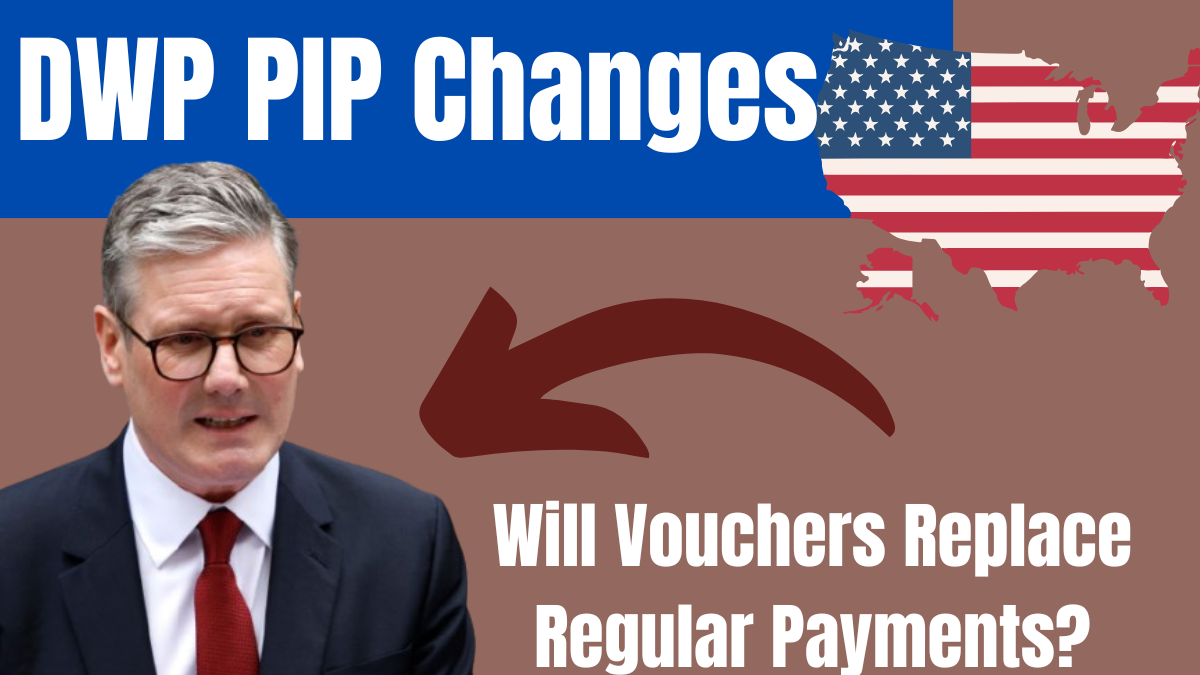The Personal Independence Payment (PIP) is a crucial financial aid for disabled individuals and those with long-term health conditions in the UK. However, major reforms proposed by the Department for Work and Pensions (DWP) could replace cash payments with vouchers, lump-sum grants, and reimbursement systems.
These changes aim to modernize welfare distribution, but they also raise concerns about financial flexibility and accessibility for recipients.

How Will PIP Payments Change Under the New System?
The proposed DWP PIP changes could introduce the following adjustments:
Will PIP Payments Be Replaced by Vouchers?
Instead of cash, PIP recipients might receive vouchers to cover specific expenses such as:
- Groceries
- Transportation
- Medical supplies
These vouchers would restrict how funds are used, ensuring they go toward essential needs.
Are One-Off Grants Replacing PIP?
A lump-sum payment system may be introduced, where recipients receive one-time grants instead of regular payments. These grants could be used for:
- Home modifications (e.g., wheelchair ramps, accessible bathrooms)
- Assistive technology (e.g., hearing aids, mobility devices)
Will PIP Be Based on a Receipt-Reimbursement System?
A reimbursement model may require claimants to:
- Pay upfront for eligible items
- Submit receipts for refunds
While this could reduce fraudulent claims, it might also create delays and financial strain for those who cannot afford to pay upfront.
What is the Catalogue-Based Support System?
Instead of receiving cash or vouchers, PIP recipients could directly select aids and appliances from a government-approved catalogue, such as:
- Mobility aids (e.g., walkers, wheelchairs)
- Household assistance tools (e.g., stair lifts, adaptive furniture)
This approach aims to simplify the process but could limit personal choice.
Why is the UK Government Changing PIP Payments?
The DWP’s main reasons for these reforms include:
- Better Targeting – Ensuring funds are used specifically for disability-related needs.
- Reducing Misuse – Preventing PIP funds from being spent on non-essential items.
- Simplifying Administration – Making the process more efficient and reducing fraudulent claims.
However, these reforms raise concerns about how recipients manage their finances under the new system.
How Will These PIP Changes Impact Claimants?
These proposed reforms could create both benefits and challenges for PIP recipients.
What Are the Key Challenges?
- Reduced Flexibility – Vouchers limit how recipients spend their benefits, removing autonomy.
- Increased Bureaucracy – The reimbursement model could delay access to critical resources.
- Financial Strain – If claimants must pay upfront and seek reimbursement, many could struggle to afford essential items.
How Do PIP Recipients Use Their Payments Now?
Currently, PIP cash payments help recipients cover:
- Utility bills
- Grocery expenses
- Transport costs
- Medical and disability-related needs
Switching to restricted payments may negatively impact financial independence.
How Can You Prepare for the PIP Changes?
If you receive PIP, it’s important to stay informed and plan ahead for possible changes.
Stay Updated on the Latest DWP Announcements
Check the official DWP website (www.gov.uk/dwp) and news sources regularly for updates on when these changes might take effect.
Engage in Public Consultations
The reforms are still under discussion, so participate in consultations to voice concerns and suggest improvements.
Seek Advice from Welfare Experts
Contact welfare rights advisors, disability charities, or advocacy groups to understand how these changes might impact you.
Plan for Financial Adjustments
- If vouchers replace cash payments, consider how this might affect your monthly budgeting.
- If reimbursements become mandatory, prepare for possible upfront costs.
What’s Next for PIP Recipients?
The PIP payment system is at a critical turning point, and these reforms could shape the future of disability support in the UK. While modernization is necessary, the financial independence and well-being of claimants must be prioritized.
Active participation from recipients, advocacy groups, and the public will play a key role in shaping the final policy decisions.
FAQs
Will PIP payments stop in 2025?
No, but the way payments are distributed may change. Cash payments might be replaced with vouchers or reimbursement systems.
What are the new PIP changes in 2025?
Proposed changes include voucher-based payments, one-off grants, and reimbursement systems instead of regular cash payments.
When will the PIP changes take effect?
The reforms are still under consultation, and no official date has been confirmed. Stay updated on the DWP website.
Can I still use PIP payments for groceries and transport?
If vouchers are introduced, they will likely be restricted to approved expenses, such as food, medical costs, and transport.
Will PIP claimants need to pay upfront under the new system?
Possibly. Some proposals suggest a receipt-based reimbursement system, meaning claimants may need to cover costs upfront before getting reimbursed.
Are one-off payments replacing PIP entirely?
No, but lump-sum grants might replace regular payments for home modifications or disability-related expenses.
What should I do if these changes affect my financial situation?
Seek guidance from welfare advisors, participate in DWP consultations, and explore other financial assistance options.
Where can I find official updates on the PIP changes?
Visit www.gov.uk/dwp for the latest announcements.
Click here to know more.
Aanchal is a passionate writer with a keen interest in storytelling, content creation, and creative expression. She enjoys exploring diverse topics and crafting engaging narratives that captivate readers.
